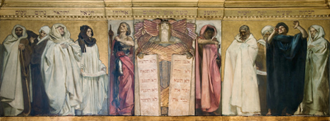Today's Gospel in Art - I have not come to abolish the Law and the Prophets but to complete them

Frieze of the Prophets (North Wall Boston Public Library), by John Singer Sargent © Christian Art
Source: Christian Art
Gospel of 9th June 2021 - Matthew 5:17-19
Jesus said to his disciples: 'Do not imagine that I have come to abolish the Law or the Prophets. I have come not to abolish but to complete them. I tell you solemnly, till heaven and earth disappear, not one dot, not one little stroke, shall disappear from the Law until its purpose is achieved. Therefore, the man who infringes even one of the least of these commandments and teaches others to do the same will be considered the least in the kingdom of heaven; but the man who keeps them and teaches them will be considered great in the kingdom of heaven.'
Reflection on the Mural painting
The artist of today's painted mural, John Singer Sargent, travelled extensively in the Middle East to find inspiration for his work. Hence the prophets are portrayed wearing the Middle Eastern dress that Sargent would have found on his travels. Going from left to right, we see the prophets: Amos, Nahum, Ezekiel, Daniel, Elijah, Moses, Joshua, Jeremiah, Jonah, Isaiah, and Habakkuk. In the centre there is a raised plaster relief of Moses holding the two tablets inscribed with the Ten Commandments. In 1893, John Singer Sargent was commissioned to create these murals to adorn the walls of the Boston Public Library. The large canvases were executed in Sargent's studios, shipped over to Boston and installed in 1895.
'I have not come to abolish the Law and the Prophets but to complete them', says Jesus in today's readings. The role of the prophets in the Old Testament was to voice whatever God commanded them to say. They were the spokespeople for God and communicated His will and plans to the people of God. We now associate the word 'prophet' with being able to tell the future. But that was not the meaning of the word prophet in the Old Testament. Their prophecies and warnings of what may happen in the future were more of a side effect of their main role of sharing the words of God with the people around them.
In fact, God Himself gave a definition of the role of the prophets at the beginning of Israel's history as a nation, in Deuteronomy 18:18-19: 'I will raise up for them a prophet like you from among their fellow Israelites, and I will put my words in his mouth. He will tell them everything I command him. I myself will call to account anyone who does not listen to my words that the prophet speaks in my name'.
LINKS
Today's story - https://christian.art/en/daily-gospel-reading/831
Christian Art - www.christian.art


















